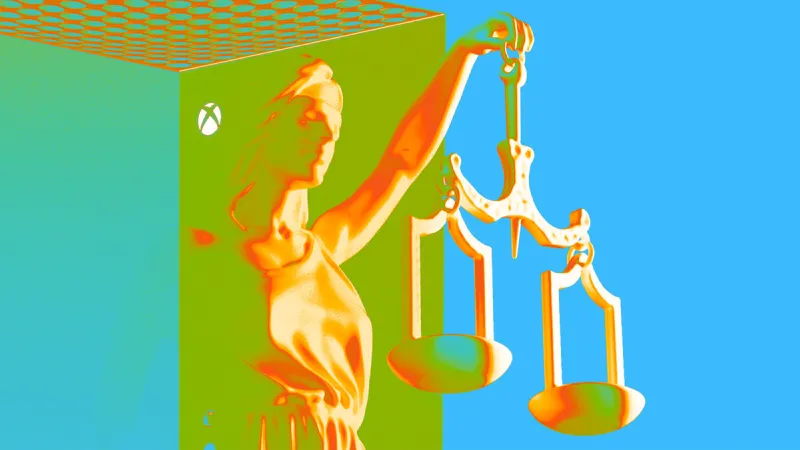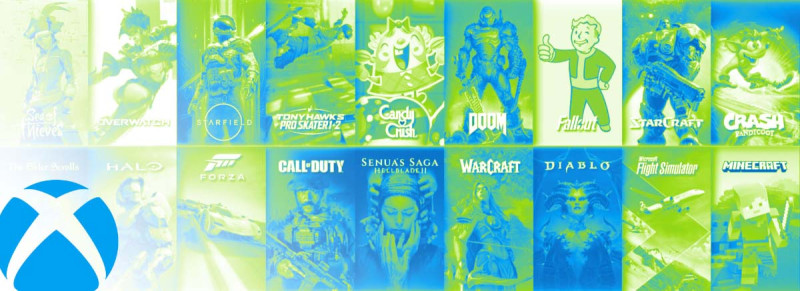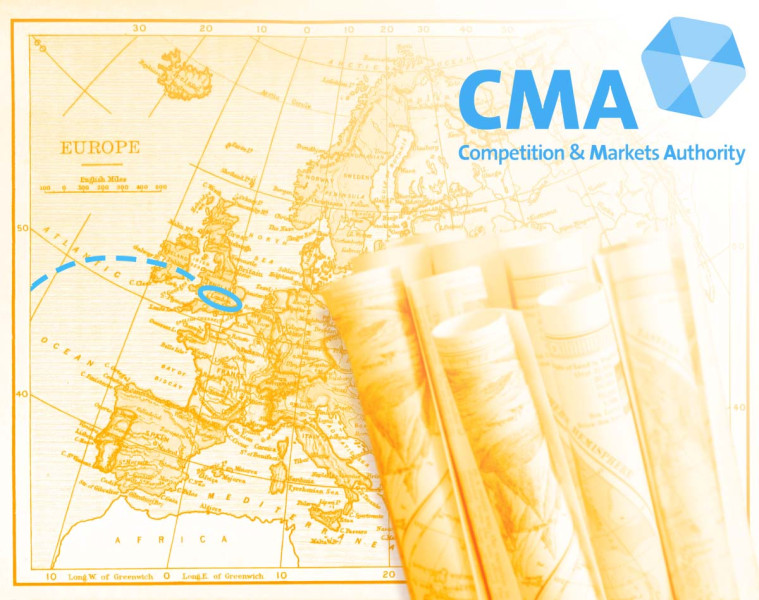
Xbox’s first-party studio lineup in 2017 consisted of five studios and a publishing arm: Rare, Turn 10, 343 Industries, The Coalition, Mojang Studios, and Xbox Game Studios Publishing. Today, six years later, Microsoft owns more than 50 studios, thanks to various acquisitions over the years.
Microsoft announced in January of 2022 that it was acquiring Call of Duty and Diablo maker Activision Blizzard for a colossal $68.7 billion, the largest video game acquisition ever. After nearly two years of Stateside court cases with the federal government, appeals and appeasements across the pond, unprecedented document leaks, direct arguments from rivals like PlayStation, and more, the deal is complete: Xbox is home to all 19 of Activision Blizzard’s studios (and King’s 11 mobile game development studios as well, since Activision Blizzard purchased the company in 2016).

Grand Ambition
Following the official announcement of the acquisition, lawyers and analysts were quick to bring up the U.S. Federal Trade Commission lawsuit against Microsoft in 1999, in which the regulatory agency argued that Microsoft was monopolizing the PC home market with its proprietary software and technology restrictions. Microsoft lost that case, with a judge ruling it violated the Sherman Antitrust Act. But an appeals court overturned it, and Microsoft and the FTC settled, which Lee Law founding partner Michael Lee says is typical.
“Ninety-nine percent of all these things get resolved by a settlement, but I think once you have a history of anti-competitive behavior – I don’t think it’s vengeance – but I definitely think there is more scrutiny placed on companies that did it once that might want to control the market in other areas,” Lee, otherwise known as GeekAttorney online, tells me.
Roughly two and a half months after the initial acquisition announcement, four U.S. senators wrote a letter to the FTC asking them to challenge the acquisition, citing general tech consolidation concerns and how this acquisition might allow Activision Blizzard to sweep under the rug a litany of accusations including discrimination, sexual misconduct, and more. Lee says this wasn’t surprising, nor out of turn for senators, noting, however, that the FTC is independent of the U.S. Senate.
The FTC announced last December it is suing Microsoft over anti-trust practices and monopolization concerns.
“The [FTC] is seeking to block technology giant Microsoft Corp. from acquiring leading video game developer Activision Blizzard, Inc. and its blockbuster gaming franchises such as Call of Duty, alleging that the $69 billion deal, Microsoft’s largest ever and the biggest ever in the video gaming industry, would enable Microsoft to suppress competitors to its Xbox gaming consoles and its rapidly growing subscription content and cloud-gaming business,” the FTC wrote in its announcement.
While that December 2022 lawsuit was set for the FTC’s in-house court, the agency also filed a separate case in a California court in an attempt to achieve preliminary injunction because “Microsoft and Activision have represented that they may consummate” the deal, according to court filings.
Lee says preliminary injunctions, when granted, pause a company’s plans or actions. These injunctions are requested when whatever is on hand presents an immediate threat or harm. If a company were sending out a product that harmed people, someone suing would likely request a preliminary injunction so that the courts could quickly tell the company to stop sending out the harmful product until the lawsuit is complete. As for why, Lee says court cases take months, years sometimes – if harm or threat is involved, waiting a year is not in the interest of those worried about the potential for damage.
A Messy Day in Court
As a result of the FTC’s lawsuit, various bigwigs, from Microsoft CEO Satya Nadella to Microsoft Gaming CEO Phil Spencer and Xbox corporate vice president Sarah Bond, testified in court. Across days of testimony, we learned a lot.
Bond claimed Activision demanded a larger revenue share to put Call of Duty on Xbox leading up to the series’ 2020 release. Bethesda’s now-former head of publishing, Pete Hines, revealed that Wolfenstein developer Machine Games’ Indiana Jones will skip PlayStation 5. In a prerecorded deposition from PlayStation CEO Jim Ryan, who recently announced he’s leaving the company, he said Xbox Game Pass is “value destructive” to publishers. Ryan and PlayStation were among the most vocal opponents of the acquisition, for obvious reasons, during court proceedings.
And that’s just a tiny chunk of what we learned during this court case. California judge Jacqueline Scott Corley denied the FTC’s request for a preliminary injunction on July 11, and the agency quickly appealed. The Ninth Circuit Court of Appeals denied it.
These court cases later bit Microsoft in the butt, even if it achieved the desired outcome. Months after the court cases, in September of this year, more than 250 private documents leaked, including emails between top Xbox executives, after a clerical mistake by someone at Microsoft. From these leaks, we learned Xbox is planning its next-gen hybrid cloud console for 2028, that Bethesda might be planning to remaster Fallout 3 and The Elder Scrolls IV: Oblivion, that the Xbox Series X might be getting a refresh with a new controller in 2024, and that at one point, Spencer considered acquiring Nintendo and Warner Bros. Games. Microsoft corrected course, but the damage was done.
“It is hard to see our team’s work shared in this way because so much has changed and there’s so much to be excited about right now, and in the future,” Spencer shared on X, formerly Twitter, after the leaks. “We will share the real plans when we are ready.”
Concerns From Across the Pond
With the appeal denied, Microsoft was clear to close in the States. Across the Atlantic Ocean, the U.K.’s Competition and Markets Authority prevented Microsoft from closing the deal with the U.K. market intact. The CMA announced its investigation into the acquisition on July 6, 2022.
“Would I say these organizations affect each other? I don’t see how they can’t,” Lee tells me when asked if the CMA’s decision to get involved might have been influenced by the FTC’s concerns. “If all these other agencies around the world are looking into some anti-competitive behavior, it would only be natural for [the CMA] to look at it. Do they have conversations on the record? Probably not, but off the record […] discussions happen.”

Lee says Microsoft could have technically closed the deal without the CMA’s greenlight, but it would have had to carve Activision Blizzard games out of its U.K. market proceedings; you don’t spend $69 billion to remove a market from your new purchase’s potential. Set to appear in court on July 28 of this year to appeal the CMA’s initial April 2023 block, Microsoft instead paused its appeal on July 11 to negotiate with the agency.
That led to a new deal, submitted on August 22, that proposed Ubisoft get the rights to Activision Blizzard game streaming for 15 years in the U.K. market. A month later, the CMA granted Microsoft preliminary approval. On October 13, the CMA approved Microsoft’s acquisition of Activision Blizzard. But it was clear the CMA was less than thrilled with how Microsoft handled itself during the process.
“[Businesses] and advisors should be in no doubt that the tactics employed by Microsoft are no way to engage with the CMA. Microsoft had the chance to restructure during our initial investigation but instead continued to insist on a package of measures that we told them simply wouldn’t work,” CMA chief executive Sarah Cardell wrote in the agency’s approval. “Dragging out proceedings in this way only wastes time and money.”
Closing the Deal
Hours after the CMA’s October 13 approval, Microsoft announced it had officially acquired Activision Blizzard.
It did so with the corporate pomp and circumstance you’d expect: an “Activision Blizzard King Joins Xbox Official Trailer” with a tone that’d have you thinking Microsoft just saved the world, a promise to deliver new worlds and stories, and Spencer’s often repeated sentiment of bringing more games to more players in more places. Controversial Activision Blizzard CEO Bobby Kotick revealed he was staying with the company through 2023, at the request of Spencer, to help with the transition, before a multi-million-dollar golden parachute likely sends him on his way in 2024. The official Activision Blizzard Twitter account said the company will begin adding its games to Game Pass “sometime in the course of the next year.”
October 13 was a big win for Xbox and its community and an even bigger win for Microsoft. After nearly two years of hurdles, court cases, document leaks, and more, it had finally completed the acquisition.

“We thought it would go through,” Lee says when I ask if he and his law peers expected the deal to pass. “We’ve seen bigger mergers go through [outside of games]. It just needed to overcome the hurdles to make everyone happy.”
As for what’s next, Lee expects Microsoft to cool down on multi-billion-dollar acquisitions.
“When there’s smoke, there’s fire,” Lee says. “If they went ahead and tried to do any multi-billion mergers, people would look into it further and say, ‘We were right.’ But this is their model. [Acquisitions] like this occur maybe once a decade […], so I do think there will be a cooldown but not a slowdown of their initial business plan which says, ‘If there’s another company doing it right and doing it better than we can, let’s acquire them and bring their knowledge in house.’
“But maybe instead of Microsoft purchasing it, it’s Blizzard purchasing it now.”
This article originally appeared in Issue 361 of Game Informer
Source: Game Informer The Trials And Tribulations Of An Acquisition: A Look At Microsoft's Journey To Purchase Activision Blizzard

